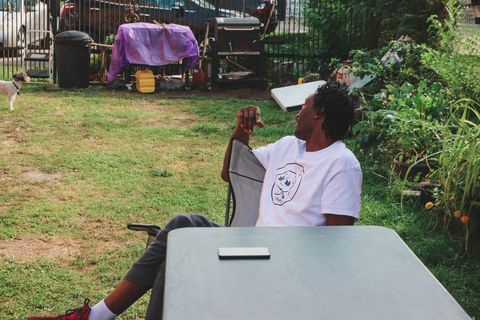
There were wood pallets painted mustard-yellow everywhere. Some leaned against the black iron fence behind me. Others rested on
the brick wall, where there are all sorts of paintings on canvas. The pallets had been made into planters holding bright flowers and tiny…plants?
I don’t garden.
But Charles Miles did—he got back into it this summer and grew kale, chard, greens, ginger, lavender, and tomatoes. He eats out of his garden at least three times a week. Just that morning, he picked out some peppers before breakfast.
I had just met this man a hot second ago, and I was now in his backyard. He reminded me of all my four brothers put together. He had a warmth of protection to him, down to directing me into a tight parking spot behind his house, one of those shared driveways where everyone is sandwiched in from all sides.
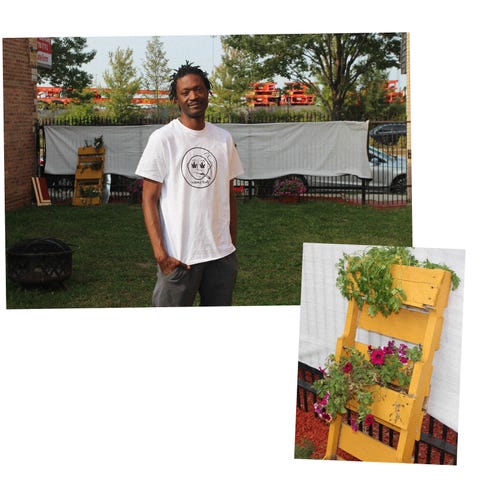
I’d started that morning in Albion, a small town in Michigan that looks like it’s out of a painful Hallmark movie with a sappy ending. Then made my way to South Bend, Indiana. That place smelled too clean and looked like people walked down the street whistling, saying “Good morning!” “And a good morrow to you!” Looking for Mayor Pete.
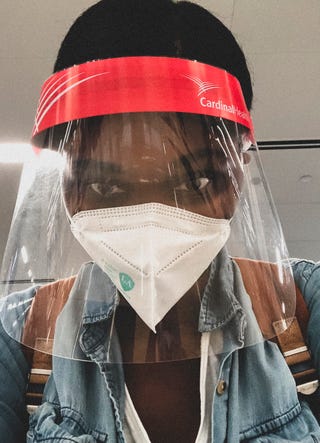
I’d sometimes call on friends for a connect, especially when I was making a stop in some small city and was nervous no one would speak with me. While much of the country tried to keep its distance from anyone they didn’t live with, here I was trying to make friends.
“Do you know someone in Stuart, Nebraska?” I’d ask a friend.
“Who’s Stuart?”
But this time, someone knew someone in South Side Chicago, and that’s when I was introduced, via a cold text, to the great Charles Miles.
It was super sunny that September Wednesday. The area reminded me of my childhood block on White Plains Road and 219th Street—the neighborhood storefronts (I can still see Miriam’s Dominican Hair Salon, and the Golden Krust Jamaican restaurant I loved), the not-so-quiet passerby conversations, loud cars plodding down the streets. I half expected to see teenagers posted up on corners or leaned up against nondescript cars, arguing over whose Air Jordans were the freshest. Or little boys with lightning-bolt barbered hair speeding down sidewalks on squeaky bikes, spinning me around.
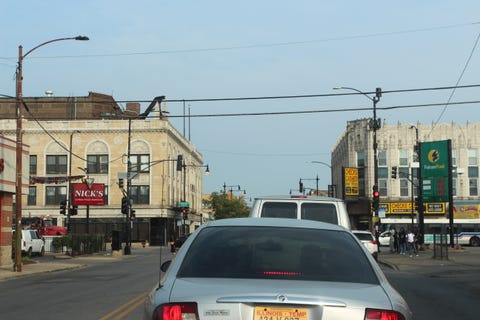
In Chicago I saw a barbershop, a corner grocer with two signs in the window: “Blacked Owned Business” in Rastafarian flag colors, and “You must have on a mask!” A “Computerized Income Tax Service” business. (Whatever that is.) A beauty/cosmetology academy. State Farm.
I suck at parallel parking. I was in my seventh state and eighth city, and I just wanted to throw that Buick Encore anywhere. I was also hopped up on Twizzlers and black coffee. (A tip for road trippers: Check out Love’s gas station dark roast. I was obsessed. It’s way better than Starbucks’ Pike Place. So smooth.)
I saw an open parking spot on 79th Street that didn’t require me to maneuver all over the place. (Thank you, Lawd!) I parked horribly and set out to find Charles, who then directed me to park in his backyard.
All I saw were happy bright colors in Charles’s yard. It was huge, too—a solid game of soccer or tennis could go down back there.
“How did you get into gardening?” I asked him. Because at first glance, with his “don’t mess with me” swagger, my first thought was not, Oh he totally gardens. He was towering, dark-chocolate skinned, and long-distance-runner slim with a cocky walk. So, yeah, I prejudged the guy. Hard. Because I honestly don’t know any man who gardens.
Long story.
One Monday morning in June, Charles felt like some soul food from Jamison’s, an itty bitty place that’s the only restaurant that comes close to his mama’s cooking. But as he pulled in, he realized it was Monday. Jamison’s is closed on Mondays.
That’s when he heard—then saw—them standing in front of one of the brick rowhouses. “There’s this guy out there, with three ladies all in his face like ‘You don’t do this and that!’” They all went in on this man, yelling at him, and the man just stood there.
“So I’m thinking it’s just a whole stuff, like ‘Oooouuh!’”
Charles ignored the argument and pulled up to the restaurant, still in his car, and chatted up the guys who worked there.
“Man, I’m starving!” he said.
“Come back tomorrow,” they told him, “We got you. We gon’ have all the food you need.”
Charles called a friend. “Man, there’s no food. What you doing?”
“What’s all that noise in the background?” she asked him.
“Some dude out here getting his ass whooped by three ladies,” he told her.
I lost it here, ’cause his body was telling the story along with him, and I was just hanging on every word, following his hands up, down, left, right. All over! “It’s all hood stuff, you know,” he said. (Oh, I know, Charles.)
He then saw the man get in the ladies’ faces and bark at them. “All I heard was, ‘Y’all better get the fuck out my front porch with that bullshit!’” He saw the guy turn away from the ladies and look to an older woman—who looked like his grandmother—standing behind him. The man walked away from the older woman behind him, then turned to the three ladies. As he turned, his hands moved to his waist. He brought out a gun and started shooting.
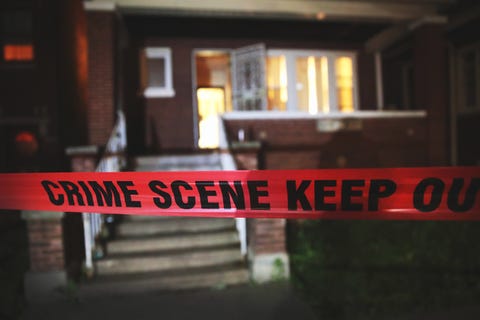
Pop! Pop! Pop!
“Right there!” In broad daylight. Charles couldn’t tell me this story any faster. His voice was high, way higher than when he started talking.
“What’s that noise?” The woman on the phone asked Charles.
“He’s shooting these women! He’s shooting these women!”
The women lay face down. Two on the sidewalk, one on the street—she’d tried to get away. Charles was the first person to call the police, he said.
He found out the identities of the people on the news that night. One of the women was the mother of the shooter’s son. The other two were her sister and her mother (his son’s aunt and grandmother).
“He tried to kill a generation of women!” Charles yelled into the air. “How are you going to explain this to your son?”
Growing up in Mississippi, at his grandmother’s house, they didn’t have a big yard, but she had a section that was just for growing peppers, tomatoes, squash, watermelon. Charles used to help. Then this year, after the shooting, he started watching DIY garden projects to get back into it. Then he went and found some pallet crates, cut them up, and just started building from there.
“I had to get into something to relieve that stress,” he said.
His maskless face went blank—the anger returning. I lost him for a minute.
The silence hung, and then:
“We are in a constant state of anger,” he said, his veined hands clasped over his mouth now. He looked up and around for words to capture how it felt to be a Black man in America. In 2020.
He rested his hands on the long, grey plastic table. He shook his head like, How do I even answer this. With a hmmm here and a sigh there, he concentrated on his thoughts some more. In the silence, I noticed his small locks. They were intentionally wild and went in every direction. I dug it. (I remembered my hot mess of a hair just then. I needed a perm or a blowout. Bad.)
“Even the most well-calmed brothers that I know are in a constant state of some type of anger because we don’t feel like we’re heard,” he said.
“Why is that?” I asked, staring at his white “Dope Smoker” T-shirt. Another brief silence was interrupted with tiny barks coming from behind him. He turned around, his right-hand dangling off the garden fabric chair and then back to me. “That’s Pepper,” he said, no big deal. “The neighborhood dog.”
I’m bad with breeds—Pepper was tiny, with grey and white fur and a bright teal collar. He (she?) danced around us under the table.
“As men who were raised to be kings and leaders of their community, with this knowledge passed down to us of who we are, and what even having locks are for”—as in dreadlocks, as Charles was alluding to their history as a symbol of Black empowerment and the roots of Marcus Garvey's Back to Africa and Rastafari movement—“and when you have that type of knowledge, knowing what your purpose is supposed to be in a country that purposefully doesn’t allow you to become that person, or you have to fight ten times harder for the same crumb, it becomes frustrating.”
Another tiny breed I don’t know joined Pepper. “This little one here, that’s Rocco,” Charles said. He pets Pepper. Then Rocco. “What’s going on, Rocco?” Rocco looked like a prima donna, with freshly groomed brown hair, all like, “Look at me, world.” They came to where we were seated, close to the black steel fence that blocked the sidewalk from his yard.
“I guess my frustration with White America,” Charles went on as Pepper and Rocco bounced away, “is that when you tell them this plight, even with the facts to back it up, they say, ‘You’re supposed to get up and rise every day,’ like, ‘what you’re going through is nothing we don’t go through.’ Lie! That’s not to negate the white struggle. But if you’re white, it’s not on purpose to you. It's a difference. There's no law, no restrictions set up purposely against you because of your skin color.”
When the protests and riots started in Chicago this summer, one of Charles’ white friends invited him to a Facebook panel on race. He felt ambushed. Some people on the panel talked about how slavery was legal. Others added and agreed that Blacks in Africa had sold other Blacks in the slave trade. Charles looked at me and gave me one of those are-you-kidding-me head spins. (Mm-hmm.) He went on to school me in the same way he addressed the panel that evening, at times with so much fire he hit the plastic table between us.
The Civil War, the Tuskegee Airmen, Dr. King. His face, boyish from even a short distance, appeared more worn the more I leaned in. He ended on the transatlantic slave trade: “What white America doesn't understand is that Black Americans feel like we're already on a slow death. We already feel like we're on a slave ship anyway. So where else can you take us if we're already at the bottom? Where else can we go? And I'm speaking from my younger generation’s perspective right now. They're like, man, for lack of a better word, ‘Fuck that!’”
I could see why he’d chosen to become a community resource coordinator for at-risk kids in Chicago. I felt all his feels. He would go on, sometimes losing his breath. Veins popping out his neck.
“The time to talk is over,” Charles Miles said. “You’ve been killing us. You’ve been jailing us. You’ve been setting us up for censuses. You've been putting drugs into our community. You've been putting guns into our community and then telling us that it's us. As long as we are left alone, we fine! But the problem is we are in the belly of the beast.”
Both hands hit the table, and he leaned back into his chair. I was just like, Preach your truth, preacher.
The real deficiency in this country, he said, is empathy. Charles joined the military when he was 18 and fought alongside white people. Only “for us to come back home and to not have the same equal opportunities that we had the same equal opportunities to die in at war? And when we come home we don’t get the same accolades? Even my white brothers should be mad at that.”
Recently he was catching up with his 27-year-old daughter. She’s most like him. They are both thinkers. Observers. “She’s [a] true revolutionary,” he beams. They like to get into the weeds of all the mess that’s going on. That day, a couple of months before the election, the topic was what happens come November, or down the line, when they’ve had it.
“And I say to her, ‘Baby girl, what you think about going back to Africa?’ She was like, ‘I dunno nothing about Africa. I don’t care nothing about Africa. My home is here. I’mma fight for what I know here.’” He throws his hands up in surrender. “And I did just like this! I had to respect that.”
With his two sons, 21 and 23, he’s been talking more about straight-up manhood. How to be a Black man. How to carry yourself. How to recognize who your real friends are. What is their hustle? What do they want to do? Teaching them how to write out a life plan.
Right now, he said, they’re too into their video games and girls. They haven’t reached that level of consciousness yet, like his budding revolutionary. “Especially my oldest son. He just graduated college. And I’m like, ‘What’s the plan now? You went to school to learn how to write business plans and all this stuff. And I want to see where all this money went!’”
Charles exhaled big.
We made our way back to his new stress-reliever. The garden spanned the sides of the backyard where we sat, to the back of his home.
“Let me show you! Let me show you!” He Vanna Whites through each section.
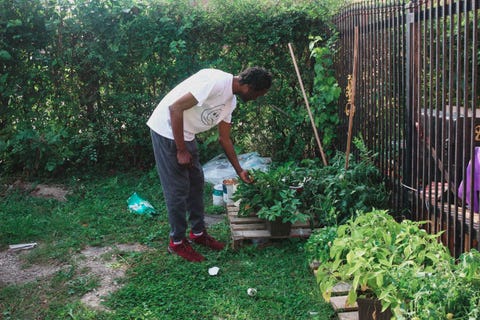
“This one here,” he points to some arrangement in a gray planter box. “I thought it was dead. But then it came back into like, ‘Oh my god!’” It was bright and perfect. He walks to the far corner, bends over, cradles some of the greens. “Here’s some more chard.” His hands are strong, but as he tends to his plants, he is careful not to break their delicate leaves.

